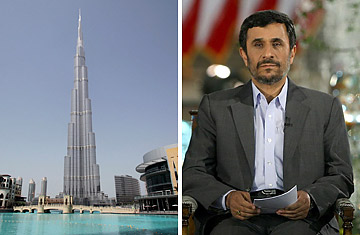
The Obama Administration is hard at work courting Russian and Chinese support for toughening up the U.N. sanctions regime against Iran. But winning the cooperation of Dubai might be equally important in the effort to squeeze Tehran. The Emirate may have no vote on the Security Council, but Iran's tiny neighbor is widely regarded as the easiest route for smuggling illicit goods into the Islamic Republic.
Iran has for years skirted sanctions by establishing a complex network of export operations along Dubai's quaysides, which are capable of shipping almost anything to Iran, just 100 miles across the Persian Gulf. Walk along the Dubai Creek wharf on any morning, and you'll see mountains of goods stacked in boxes, ready to be loaded onto boats bound for Iran. Most of the contents — everything from books to clothes — are legitimate, and violate no U.S. or international sanctions, which until now have focused narrowly on entities believed to be involved in Iran's nuclear program. "To the extent that normal consumer goods are getting into Iran, that does not undermine the overall policy," says Stuart Levey, Under Secretary of the Treasury for Terrorism and Financial Intelligence. "We are not trying to make [the Iranians'] lives unpleasant," he says.
But, officials say, the heavy volume of legitimate trade moving from Dubai to Iran — trade between the two countries was worth $12 billion last year, most of it imports into Iran — makes it easier to camouflage illicit items. About 400,000 Iranians live in Dubai, and about 8,000 Iranian companies are registered there, including two major banks, Bank Melli Iran and Bank Saderat Iran, both of which are currently under U.S. sanctions on the allegation that they're funding Iran's nuclear program.
In recent years, Dubai customs officials have uncovered U.S. aircraft parts bound for Iran's military, and last April U.S. officials arrested an Iranian living in California for trying to smuggle U.S. attack helicopters to Iran's military via export companies in Dubai. U.S. officials believe that any sanctions that effectively target Iran's nuclear energy and prevent Iran from importing the equipment needed to overhaul its aging oil infrastructure would have to plug the Dubai loophole.
Levey says he has flown to Dubai about 12 times over the past two years, attempting to persuade officials of the United Arab Emirates (of which Dubai forms part) to crack down. "The UAE is really grappling with the issue," he says. "The Emirates are aware of the reputational risks with dealing with Iran, and they take those risks seriously."
But it's an uphill battle. Al-Jazeera TV last week showed footage of a packed wharf in Dubai, piled high with goods, including boxes of Panasonic flat-screen televisions and Whirlpool refrigerators — possibly in violation of U.S. sanctions if American companies are exporting to Iran without U.S. government licenses — but with no customs agent in sight. Only a small portion of shipments are checked, and officials rely on the honesty of shipping brokers in filling out manifests.
Iran's deep roots in Dubai's economy pose a further problem for any more expansive sanctions regime. There are Iranian stores, restaurants and companies in almost every building in Dubai, and tens of thousands of Iranians fly regularly to the emirate, many simply to enjoy its free-wheeling lifestyle. "We're talking about tremendous volumes [of exports] in Dubai," says Lisa Prager, former assistant deputy secretary of commerce, who dispatched the first attache to Dubai in 2002 to try to stop military smuggling to Iran; as a Washington attorney, she now represents companies that have been charged with transshipping illicit goods to the Islamic Republic. Part of the problem, she says, is that U.S. officials have no authority to crack down themselves on sanctions-busters in Dubai.
Even without new U.N. measures in place, one area where the U.S. has been successful in imposing its unilateral sanctions is in the financial sector, where it uses the leverage of threatened exclusion from the American financial system to press Dubai's financial services industry into observing U.S. curbs. Iranians in Dubai say they find it increasingly difficult to get credit, even for workaday business dealings. "We have to pay full amounts to the supplier in order to ship the goods to us," says Morteza Masoumzadeh, deputy executive director of the Iranian Business Council in Dubai, whose shipping company focuses on trade with Iran. "If we go to banks and ask for credit facilities they say 'Oh no, you are Iranian, we cannot'. "
While Iranian banks in Dubai might extend credit to Iranians living there, Masoumzadeh says that credit is often rejected by clients. "Iranian bank letters of credit are not accepted by suppliers in Europe and the Far East." However, he says, much of the trade can now go directly from Asian suppliers to Iran's Bandar Abbas port, without passing through Dubai at all. Iran's government-owned Islamic Republic of Iran Shipping Lines, or IRISL, has a fleet of vessels that go directly to Iran's ports from cities around China and Korea, as well as the Netherlands, Germany and Italy. So, even if the Dubai route was choked off, Tehran may yet have alternatives less vulnerable to U.S. pressure.
